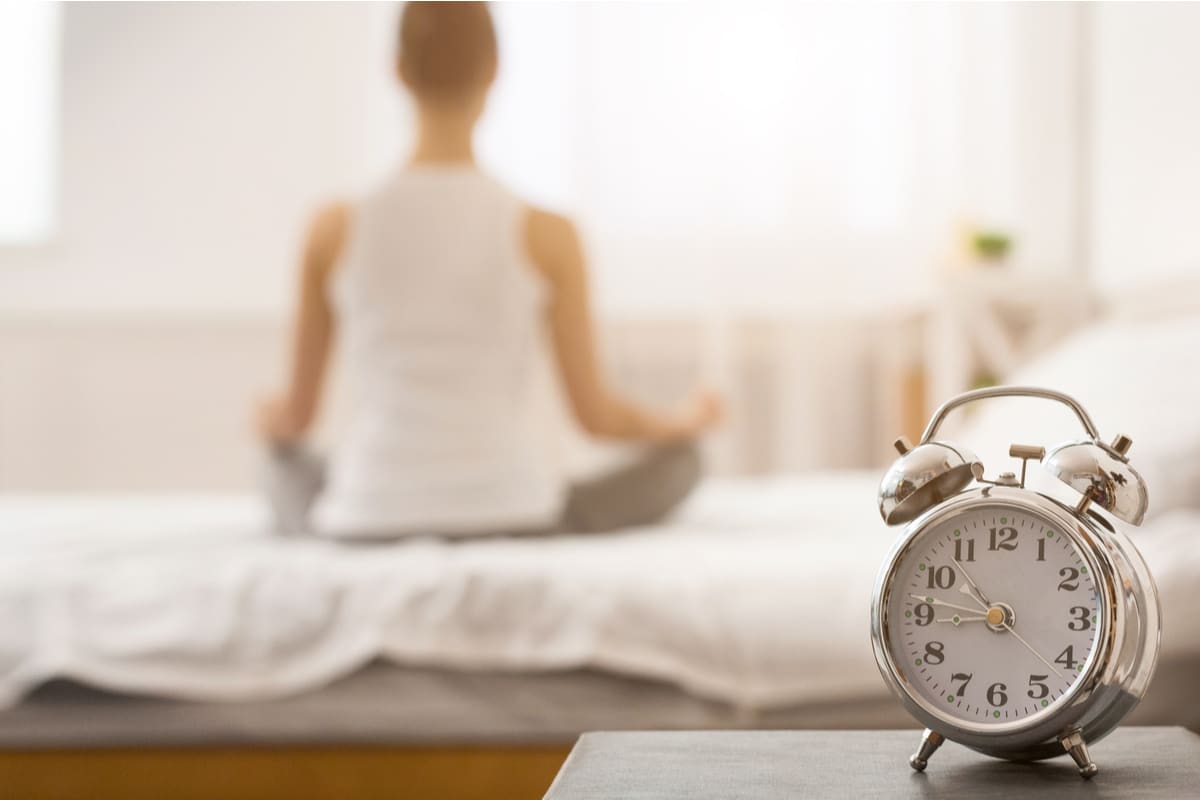Meditation is a method, a tool for self-cultivation. It can be used both as a way to improve yourself in very normal ways and as a spiritual path.
You may use a functional meditation, like the mindfulness of breathing to achieve a goal like passing a test or preparing for a presentation.
Remarkably, practicing the mindfulness of breathing meditation for 2 weeks, students showed a 30% improvement on GRE scores.
Or you may enjoy a meditation with more spiritual content that helps you to reflect on questions like, who am I? What’s my purpose in life? These awareness meditations engender lifelong spiritual reflection that never really ends.
You may find you are interested in spiritual reflection, but still you need to prepare your mind for this work. In this case, functional meditations that help you reduce anxiety or stay focused can help you put your life in order or improve your mind for deeper reflection.
How Long Should You Meditate For?
Functional meditations require 10 to 15 minutes, twice a day to be most effective. Once in the morning and once at night; right after you wake up, and right before you go to bed, to bracket your day.
This bracketing activates your subconscious and recruits your best intuitive resources. It settles your mind at a deep level, both at the beginning and the end of the day. So, you can sleep better, and you can also focus and function better.
It is a ritual that starts your day and gives you closure; a way to remind yourself of your intention and what you’re living for.
Don’t Try To Meditate For An Hour
An hour-long meditation is probably overkill and will be likely too long unless you need a long time to relax or to fall asleep.
Some longer meditations, like the 45-minute body scan, can help you reach a deep state of relaxation if you are anxious and need to unwind.
But, if you are doing hour-long meditations in the midst of worldly life, be careful because you may be using meditation as a kind of delusion, procrastination or emotional avoidance.
It’s better to have a constant schedule that you can maintain, even if it’s one minute a day. This ritual of doing the same thing every day will benefit you more than the ‘benefits’ of meditation itself. This consistency will help you develop your will, which is essential to living a purposeful focused life.
How Often Should You Meditate?
If you’re going to meditate, you should do it a little bit every day.
Block out some time, whatever you can manage and just start meditating. See what you can do and then maintain it for a while.
If it’s a minute a day, do that and build it up until it’s 15 minutes. Then add another meditation session in your day so it is twice a day, once in the morning and right before you go to bed.
One-time meditation sessions have been shown to be effective, but not be as effective as sustained practice.
In order to see continued benefits of meditation, it is recommended to have a short training in meditation, followed by sustained practice and occasional intensive booster sessions.
Enjoy Your Meditation
But I can’t stress this enough, don’t meditate unless you actually enjoy it.
Don’t fight with yourself to conquer this skill.
It won’t help you if you power through it, struggling to do more, trying to meditate for longer periods of time.
You can do other focused activities instead of meditation that will have a similar effect. Physical activities like cooking, cleaning, walking, gardening, painting, something simple can put the mind in the state of happy repose and refresh you.
If meditation doesn’t feel right for you, find focused activities that you enjoy doing.
Dive In
If you are diving into meditation, it’s a good idea to start with guided meditations either with an app or by taking meditation classes, just to get a sense of what meditation is.
You can start to ‘memorize’ and practice the meditations with accountability and instruction, just like learning the piano, a dance routine or memorizing a script.
If you’re interested in a deep dive into meditation, you should reflect on why you are meditating, know what your intention is and go on a retreat.
You should not try to live your daily life, rather you should seek a respite for spiritual religious contemplation and leave the world.
How Long Does Meditation Take To Work?
How long meditation takes to work depends on the person and the meditation, but what the research reveals is very inspiring.
In a short amount of time, even first-time meditators show improvements in concentration, focus and awareness.
- 8-10 minutes of meditation has been shown to reverse the erosion of focus caused by multi-tasking and to lessen mind wandering.
- Attention blink, the inability to direct our awareness to relevant stimuli, is erased after 17 minutes of the meditation.
- A 2-week course in mindfulness of breathing has shown improvements in concentration and a 30% improvement in students’ GRE scores.
It is good to think of meditation in terms of life-long hours. Generally, 10,500 lifelong hours makes for a master meditator.
This level of experience brings with it many admirable qualities including less reactivity to disturbing events, effortless compassion and empathy, heightened awareness, and a less grasping sense of self.
However, after just 11 hours of meditation, which is 20 minutes a day for one-month, studies show that the brain actually begins to change.
In my experience, when I started meditating I could feel its effects instantly.
Many people report a similar instantaneous effect because it’s not really about meditation, it’s about your spiritual mind. The experience of meditation is just an expression of a deeper movement in your mind.
Try it out. Find one minute or ten and get started.
Attempt to maintain a daily routine, then work up to 20 minutes a day.
And enjoy it; use your practice to reflect, relax, engender compassion and make the world a better place!






